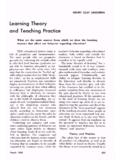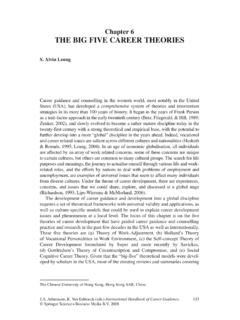Transcription of ARE PEOPLE THE PUPPETS OF SOCIETY? - Manor Sociology
1 Are PEOPLE the & quot ; PUPPETS of society & quot ;? 2 Student Notes ARE PEOPLE THE & quot ; PUPPETS OF society & quot ;? What makes PEOPLE behave in the ways they do? Are their actions determined by forces beyond their immedi- ate control or are they able to choose and select their behaviour with an element of free choice? This is one of the oldest problems philosophers and social scientists have grappled with and it still emerges in many debates today as the example below illustrates. The problem has led to a long running disagreement in Sociology known as the structure/action debate. This refers to two different theories (or explanations) of the way we behave as members of social groups. Put very simply, the two sides of the argument look something like this: SOCIAL STRUCTURE THEORY Example Our behaviour is controlled by the organisation & quot ;Unemployment and educational failure will force and structure of the society in which we live. To working class kids into anti-social behaviour.
2 The some extent we are like & quot ; PUPPETS & quot ; of society . chronic lack of affordable facilities in inner cities adds to a despair which leads to drugs and crime.& quot ;. SOCIAL ACTION THEORY. society is the end result of the way PEOPLE choose to act, we are not controlled by it. & quot ;A young person may view their future with anxiety Almost all our actions are based on our own and this could lead to their choosing to be very understanding of the world around us. conventional in the hope of their & quot ;getting on& quot ;, but could result in other possible behaviour, perhaps becoming a New Age Traveller.& quot ;. Within each of these perspectives there are differences of emphasis and opinion. Within social structure theory, for instance, two distinct perspectives can be identified: Functionalism Functionalists try to explain why societies are ordered and stable rather than in chaos. They are interested in the predictability of our behaviour. Most PEOPLE most of the time seem to follow some sort of unwritten rule- book of behaviour in the way they speak, dress and act.
3 Functionalists have studied the reasons why we conform and how we learn unwritten social rules. They emphasise the process by which society moulds the behaviour and personalities of its members. This process is referred to as According to functionalists we are socialised into norms, values and roles through our involvement in social institutions (or agencies of socialisation) such as the family, schools and the mass media. The idea of roles provides a good illustration of the way behaviour is determined by the social structure in functionalist theory, as you can see from the following example: Role Norms Values The role of a woman in the These are accepted ways of Norms are based on more nuclear family. behaving, such as & quot ;the general values: beliefs about woman cooks the childrens' what is right and wrong, such tea& quot ;. as & quot ;women should be primarily responsible for the care of children& quot ;. The wife's behaviour is, to some extent, therefore, controlled by the role she plays.
4 If she deviates from the norms associated with the role then PEOPLE may think she is odd or not a good wife . Marxism Marxist sociologists also use a structural analysis in which an individual's behaviour is heavily influenced, if not wholly determined, by the structure of society . But Marxists have a much more negative view of this process than functionalists. They believe that most societies are extremely unfair, containing vast inequalities which mean that a few benefit at the expense of the majority. Because of the way society is organised PEOPLE have conflicts of interest: what benefits one group may not benefit another. connect publications, 1996. Are PEOPLE the & quot ; PUPPETS of society & quot ;? 3 Student Notes These differences of interest influence their behaviour: Position in society Interests Behaviour Owner of business To make the largest so they attempt to pay their (or capitalist) profit possible workers as little as possible If it is in most PEOPLE 's interest to fight for better pay and, Marx believed, ultimately to overthrow capitalist society in favour of communism, how is it that so many PEOPLE do not behave in this way?
5 How is it that so many seem satisfied with their place in society ? Marxists believe that the agencies of socialisation such as the mass media and education system are controlled (directly or indirectly) by the powerful or dominant class in society : the capitalists. This means that the roles, norms and values PEOPLE are encouraged to accept are those which are in the interests of the powerful (or ruling) class. Marxists call these ideas ideology or dominant ideology. They would argue that human greed is not something we are born with but rather part of an ideology which we have been taught and which serves the interests of capitalists in their pursuit of profit. A Social action perspective: interactionism Structural perspectives tend to focus on large scale social structures and institutions such as the education system. This approach is sometimes referred to as macro Sociology . In contrast, social action perspectives such as interactionism are more interested in PEOPLE 's behaviour in small groups, relationships within an individual classroom rather than the education system as a whole for example, an approach known as micro Sociology .
6 Interactionists believe PEOPLE behave as they do partly because they are influenced by the behaviour of others towards them. They also suggest that we & quot ;figure out& quot ; particular situations we find ourselves in and act on the basis of that & quot ;figuring out& quot ;. To put it another way, we select our behaviour on the basis of the interpretation or meaning we give to situations. The following situation provides an example of this: You go to a party at a friend's house. You walk through the door and immediately have to make sense of what is going on before you choose what to do. What kind of PEOPLE are at the party? How are they behaving? What rooms are there? What is going on in them? Once you have made sense of, or interpreted the situation, you will decide whether to stay, go or come back later, which room to go to, who to talk to, what to do and so on. This is very unlike the structural accounts we have been considering. Here is a person relatively free from structural constraints or controls, making active choices regarding how to behave based on their own meanings and interpretations.
7 The basic difference beween structural and action perspectives is shown in the diagram below: Structural perspective society or SOCIAL STRUCTURE controls behaviour Action perspective PEOPLE 'S INTERPRETATIONS of the world around them influence behaviour So are we the PUPPETS of society & quot ;? You must think about this for yourself. Most sociologists today accept that both structure and action are important in understanding social behaviour. The two positions are better seen as the opposite ends of a continuum rather than as clear alternatives. Most sociologists & quot ;fit& quot ; somewhere between the two positions. Recently, the British sociologist Anthony Giddens has developed structuration theory. This is an attempt to get round the structure/action debate by incorporating both structure and action in the same theory. In Giddens' view they are two sides of the same coin. PEOPLE do make choices and act on their interpretations of the social world, but their choices are constrained by the structure of the society they live in.
8 You have made a decision to study Sociology but that decision will have been influenced by a number of factors to do with contemporary society such as, what is the employment situation in the area where you live? How does society view Sociology qualifications? Can you afford to follow the course? connect publications, 1996. Are PEOPLE the & quot ; PUPPETS of society & quot ;? 4 Data Response Activity SOCIAL STRUCTURE THEORY. Here are two pieces of writing which illustrate the social structure view that our behaviour is, to a large extent, controlled by the society in which we live; by its organisation and culture. We are the & quot ; PUPPETS of society & quot ; in other words. One account represents a Marxist view, the other a functionalist view. A C. MARXIST VIEW FUNCTIONALIST VIEW. The radical or Marxist view .. says that working Consensus theory (functionalism) .. argues that class children are supposed to fail. The schools a society 's cultural rules determine, or structure, are shaped by (the needs of) the capitalist system.
9 The behaviour of its members, channelling their In this system only a few can succeed. Working actions in certain ways rather than others. They do class kids must have their ambitions & quot ;cooled so in much the same way that the physical out& quot ;.. they must be made to accept working class construction of a building structures the actions of jobs with their inferior opportunities, rewards and the PEOPLE inside it. Take the behaviour of students conditions and achieving this through ideology is in a school. Once inside the school they will display preferable to physical force. Just as factories quite regular patterns of behaviour. They will all produce products, schools are ideological walk along corridors, up and down stairs, in and sausage factories, producing pupils with the out of classrooms, through doors and so on. They correct attitudes, disciplines and docility needed will, by and large, not attempt to dig through floors, by capitalists. According to this view, it is hardly smash through walls, or climb out of windows.
10 Their surprising that most working class kids fail - they're physical movements are constrained by the school supposed to. buildings. Since this affects all students similarly, adapted from P. Willis, unpublished lecture notes their behaviour inside the school will be similar - and will exhibit quite definite patterns. In .. (functionalism).. the same is true of social life. B Individuals will behave similarly in the same social THE & quot ; PUPPETS OF society & quot ; settings because they are equally constrained by cultural these social structures are not visible in the way physical structures are, those who are socialised into their rules find them pretty determining. P. Jones, & quot ;Studying society & quot ;, Collins Educational,1993. ACTIVITY. 1. In Item A, Paul Willis describes Marxists as seeing the school as an & quot ;ideological sausage factory& quot ;. What do you think he means? 2. Items A and C emphasise the importance of the process of socialisation in encouraging conformity.








